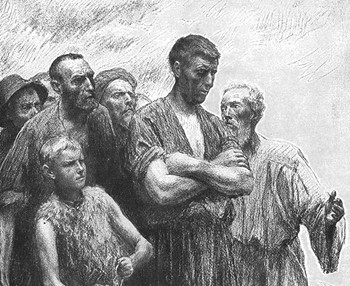For most of us, our image of a vineyard is limited to an occasional travel show on television, or maybe a wine-tasting tour at a local winery, or simply just a well-produced article from a current gourmet food and wine magazine. But we can all relate to the work of a gardener, even if be that of a small home garden. So it shouldn't take a stretch of our imaginations to consider what both the parables of Isaiah and Jesus mean for us.

I grew up in Paterson, New Jersey – known at the time as a city specializing in the manufacture of silk. This is about as far removed from a vineyard as one could possibly imagine. We lived with my grandparents and I remember vividly the garden, planted each year by my grandfather, which took up three quarters of our backyard. That garden provided both households not only with our yearly produce (which included tomatoes, zucchini, peppers, eggplant and a multitude of other vegetables), but also with grapes from which Nonna made her famous homemade jellies, as well as the not so few gallons of Gramps’ wine.
What impressed me most was the amount of time that he spent in his garden and the tender care he gave to each plant. And he did this after a long and arduous day working at one of the many “dye-houses” located throughout the city (as a kid, I always thought that Gramps worked at a “die house” – which is probably a more accurate term for the working conditions in the factories in those days). But nevertheless, he did all that he could to make his garden productive and fruitful each season.
No matter who we are or where we live, we can still understand the amount of work and care that goes into maintaining a garden or a vineyard.
We call ourselves, “God’s people,” the “vineyard of the Lord of hosts.” The Isaian parable should certainly speak to and challenge us. We trace our faith life to its origins in God, who planted the seed of Christ’s life in us, who nourished it by the scriptures and sacraments, and who gave us prophetic witnesses, parents and teachers. God has protected that life within us when it may have been tested and broken; He renewed it when we wandered and He caused it to grow at the most unexpected times. So, it is important for us to remember with gratitude all God has done for us as individuals and as a community.
And it is clear from Jesus’ parable that no one is entitled to or has ownership of the vineyard. We are simply tenants in the vineyard who are asked to respond to an unearned invitation to be members of a new community. We claim to have accepted and responded to this invitation, but we also know it is a gift given, not something we have earned, and it is important for us to be conscious that what we are doing to live the Gospel is, in fact, “vineyard work” and we will be held responsible for it at “the proper times.”
There is a lot of work to do in our world to make it reflect God’s will and desire for us. Today’s parables invite us to stay with the task and they remind us that this work isn’t ours alone to complete. We are assured that the owner has invested time, care and concern for the work we do in the vineyard. The full responsibility for the success of our work is not only ours. We have, after all, a loving Owner who has invested a lot in this vineyard and who finally sent his Son to be with us.
Today we are being told something about God that we all need to hear. God doesn't give up on us, even when we have turned away. He is even willing to risk looking foolish in our eyes, willing to come again and again to us. God's love doesn't diminish, even when we reject Him or live lukewarm lives of faith.
But we must continually ask ourselves the questions posed by these parables. Where is our place in the vineyard? And, after all He has done for us, what fruits will God find at harvest time?
[Image: The Wicked Vinedressers by Eugène Burnand]





